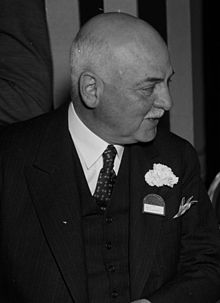Angelo Joseph Rossi
Angelo Joseph Rossi | |
|---|---|
 | |
| 31st Mayor of San Francisco | |
| In office January 7, 1931 – January 8, 1944 | |
| Preceded by | James Rolph |
| Succeeded by | Roger Lapham |
| Personal details | |
| Born | January 22, 1878 San Francisco, California |
| Political party | Republican |
| Spouse | Grace Mabel Allen |
| Children |
|
| Profession | Florist |
Angelo Joseph Rossi (January 22, 1878 – April 5, 1948) was a
Life and career
Rossi was born in Volcano, Amador County, California, and came to San Francisco in 1890 with his widowed mother and six siblings after the family home and general store burned to the ground in minutes. (His father, also named Angelo, left Italy in 1849 at the age of 16 aboard a ship loaded with marble that departed from Genoa. When he arrived in Amador County, he mined for gold and opened his general store.) When Angelo arrived in San Francisco with his family in 1890, he attended school but left after 6th grade to work in jobs that ranged from cash boy to a clerk in a couple of different florist shops, including Carbone and Sons and Pelicano and Sons, which became Pelicano and Rossi when he became a partner in the early 1900s. Eventually he opened his own company, Angelo J. Rossi, Inc., and during his tenure in office the florist company continued to operate in a sparkling Art Deco-motif building Angelo owned at 45 Grant Avenue.
He was first appointed mayor when mayor James Rolph resigned to become Governor of California in January, 1931. After completing the remaining year of Rolph's term, Rossi was elected in his own right as mayor in November 1931. He was reelected mayor for second and third full terms in 1935 and 1939 respectively. Running for a fourth term as mayor in 1943, he was defeated when a protégé of his, George Reilly, ran against him, splitting the Catholic vote, and when Roger Lapham was tapped by business interests to run, in part to advance their cause regarding the city's purchase of the Market Street Railway.
A

Rossi was adamantly
On July 19, 1934, Mayor Rossi spoke on national radio, "I congratulate the real leaders of organized labor on their decision and the part they have played in ending the general strike. San Francisco has stamped out without bargain or compromise an attempt to import into its life the very real danger of revolt... We will deal effectively with the small group who opposed peace and plotted revolution."
When his police force raided political offices and worker organizations after the strike, Rossi issued a statement: "I pledge to you that as Chief Executive in San Francisco I will, to the full extent of my authority, run out of San Francisco every Communist agitator, and this is going to be a continuing policy in San Francisco."
During a period of publicized police scandal, he asked for and appropriated seventy thousand dollars to investigate corruption in the department. The District Attorney,
In an extended strike late in the late 1930s, Rossi lashed out at
He died in 1948 and is buried in
See also
References
Bibliography
- Ward, Estolvo, "The Gentle Dynamiter - 1983 Ramparts Press LC# 382-80645 ISBN 0-87867-089-0
- Treasure Island World's Fair - 1939 at www.sfmuseum.net
- San Francisco General Strike – Request for More Troops – 1934 at www.sfmuseum.org
- Labor Day Speech Monday, September 4, 1939

